MondayDecember 06, 2021 / 10:15 AM / by FDC Ltd / Header ImageCredit: iStock
The healthcare industry registered a 4.65% increase inthe second quarter of the year11; however, this should not be used to definethe sector's performance as the level of brain drain in the sector continues torise. Although the country is doing well economically with a 5.01% growth rate,the country still has a long way to go as diseases such as hepatitis and HIVaids are seriously affecting a significant percent of the total Nigerianpopulation. Using the pandemic as a lens, the country could have effectivelylimited the virus's spread if it had a better healthcare system; unfortunately,residents were forced to rely on traditional and herbal means of survival priorto the advent of vaccines.
According to Nigeria HealthWatch, there are 80,000doctors registered with the Nigerian Medical and Dental Council as of June2021, but only around 35,000 of them are practicing in the country. The othersare working in other countries - roughly 4,000 in the United States and 5,000in the United Kingdom - and a handful have changed careers. leaving only 35,000doctors responsible for the health of nearly 200 million Nigerians.12 This iswoefully insufficient. The World Health Organization suggests aone-doctor-to-600- patients ratio for member countries to fulfill theSustainable Development Goals in health care. Nigeria, for example, has apopulation density of 0.3 persons per 1,000, compared to 1.8 in China, 2.6 inthe UK, 2.8 in the US, 4.3 in Sweden, and 5.83 in Italy. In other words, in thecountry, one doctor attends 5,000 people.
Infact, this is the second time in less than three years that Saudi officialshave gone directly to Nigerian physicians in order to revitalize andre-energize their own healthcare system. Hundreds of physicians, includingconsultants, specialists, and other relevant professionals in all medicaldisciplines except psychiatry, with various years of experience, flocked toAbuja and Lagos for the well-publicized recruiting. According to an estimate,they numbered around 500 people. Anesthesia, ICU, pediatrics surgery, familymedicine (consultants only), obstetrics and gynecology, ENT, emergencymedicine, all sub-specialties (surgery), all sub-specialties (internalmedicine), orthopedic surgery, ophthalmology, radiology, hematology, and histopathologywere among the specialties covered by those interviewed.
Corruption,insufficient funding, inadequate facilities and poor working conditions allhave an impact on the country's healthcare industry. Although their influenceon the health care industry's performance cannot be exaggerated, they alsoserve as factors contributing to the high level of brain drain in the sectoraccounting for majority of the sector's deterioration.
Corruptionis a widespread issue in the society, and it has stymied the health-caresector's growth. As of January of this year, the country was ranked as thesecond most corrupt in West Africa. This issue has an impact on the health careindustry since money intended for boosting the sector's performance are insteadembezzled and utilized for personal gain. There is also the issue of nepotism.Medical practitioners do not recruit people based on their talents and degreeof education, but rather on how well they know them or how many advantages theycan derive from them. As a result, the sector's production and efficiencysuffers. This is why some doctors would prefer to emigrate to other countrieswhere they know they stand a chance in an even playing field.
Workingcircumstances for these medical practitioners are exceedingly poor; as aresult, several medical practitioners opt to work overseas. This issue hasresulted in multiple strikes by the medical practitioners in this sector. Therecent one being as a result of late and defaulted payments. This can beexpected as the Nigerian government has been operating with a deficit budgetsince 1981. For the past ten years
Nigerianshave spent about $ $11 billion on medical services. Specifically, Nigeriaspends approximately $1 billion every year on medical tourism, primarily toIndia. This was reported by a BusinessDay article which stated that in 2013,47% of Nigerian travelers to India came for medical reasons. Furthermore, theyspent up to N41.6 billion on medical expenses
In theAbuja Declaration of 2001, Nigeria and other African Union member states agreedto allocating at least 15% of their national budgets on health. Unfortunately,throughout the last 18 years, the country's rate has never exceeded 6%. Exceptfor the N547 billion health budget for 2021, which accounts for 7% of the totalbudget. The level of health infrastructure is also a growing concern as a recentassessment by the real estate firm Knight Frank revealed that, Nigeria would "need 386,000 additional beds and $82 billion in health-care real estateassets to match the global average of 2.7 beds per thousand inhabitants."
The World Bank's figures are similarly bleak. Nigeria's government spends only3.89 % of its $495 billion GDP on healthcare, compared to 8.25 % in SouthAfrica and 5.17% in Kenya. In 20 years, recurrent expenses have absorbed 78% ofoverall health spending, while capital has taken only 22%. Between 2001 and2021, recurring expenditure climbed by 2,822%, while capital expenditureincreased by little over 400%. This clearly shows that there is a huge gap inhealth infrastructure
Despitethe fact that the healthcare sector is suffering greatly, there is still reasonto be optimistic about the future. This might be accomplished through combatingcorruption. People should be hired depending on their educational level inorder to enhance production. Additionally, money should be used for theintended purpose. This is necessary because it will allow the health-careindustry to reach its targeted degree of development. With the increase infunds should also come proper management of these funds as this would preventembezzlement.
Theissue of brain drain in the health care sector can be curbed througheffectively through increase investment and spending. As stated before, theWorld Health Organization has revealed that Nigeria has a five hospital bedsper 10,000 patients which is way below standards. We should expect to see someprogress in this area if we raise spending, starting with greater capitalexpenditure, which will have long-term implications in the sector.
Thegovernment can address the issue of bad working conditions by providing greaterwork benefits. Even with the existence of the deadly corona virus, the hazardallowance of these medical practitioner is still set at a relatively low leveland this can be very discouraging to these medical practitioners. Thegovernment should strive to increase the hazard allowance in order to encouragethe 88 percent of doctors who are actively seeking opportunities abroad tobegin to look domestically.14 Also, workers should be fairly compensated forthe amount of work and effort they put in and should be paid based oninternational standards.
We canexpect the quality of medical services to deteriorate as the amount of braindrain in the healthcare industry rises. This may be avoided by enhancingmedical practitioners' working circumstances, increasing investments in thesector and curbing corruption in the country. As a result, the country wouldsee better levels of growth, a higher standard of life, and increasedefficiency and production.
Related News
- Returning Africans are reversing the brain drain
- Higher wages will stem Nigerias brain drain
- NCDC Issues Statement on the New COVID-19 Variant
- ASR Africa boosts Ogun State Healthcare Systems with N2.5bn Grant for Mother and Child Hospital
- AfDB Outlines New Health Infrastructure Strategy to Health Ministers in ECOWAS
- ASR Africa Initiative Formally Hands Hospital to Nigerian Police in Abuja
- DrugStoc Secures $4.4M in Series A Funding to Expand Access to Quality Pharmaceuticals in Africa
- UBA Foundation Sensitises Staff, Customers on Mental Health Awareness
- Healthlane Launches App, Announces Healthcare Technology to Enable Longer and Healthier Lives
- Ecobank Day: Stop the Discrimination Against Victims of Mental Health Disorder - Akinwuntan
 Lagos, NG • GMT +1
Lagos, NG • GMT +1











 1283 views
1283 views







 Sponsored Ad
Sponsored Ad
 Advertise with Us
Advertise with Us









